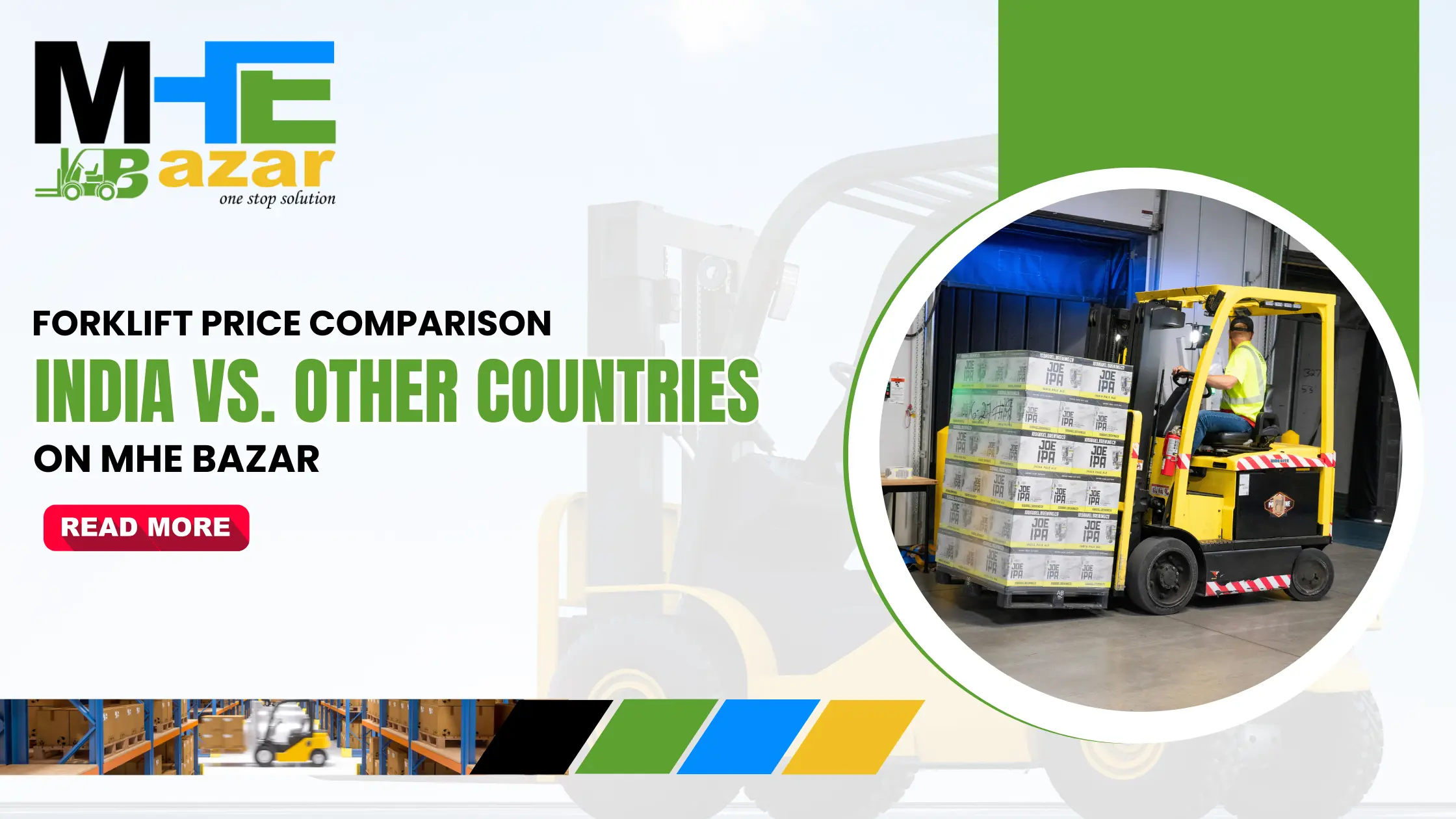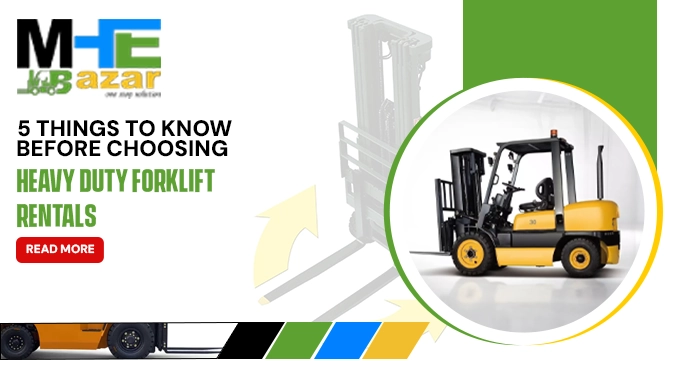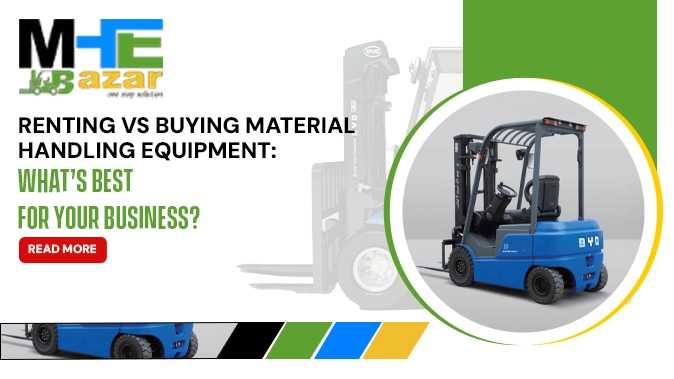For any query, email us at sales.1@mhebazar.com
or call us on +91 9289094445,

Forklift trucks play a very important role in various industries and are among the most prominent material-handling equipment. In this guide, we will discuss various types of forklifts in detail.
In order to find the perfect forklift for the job, you need to carefully understand the benefits and limitations of different types of forklifts and choose the one that suits your needs the best. You will also find forklift types and names listed in our guide so that you can also use it as a reference whenever you start looking for one.
We strongly recommend considering MHE Bazar as your trusted platform for exploring forklift trucks for purchase. With a wealth of expertise and a commitment to quality, MHE Bazar ensures that you find the perfect solution tailored to your specific needs. We provide various types of forklift trucks from reputed manufacturers so that you always get the best option available at MHE Bazar.
It's crucial to understand the different types of forklift trucks before making a purchase decision for several reasons. Different industries have varying material handling requirements as the material varies in terms of quantity and volume in each case. By knowing the different types of forklift trucks available, you can choose a model that aligns with their specific operational needs.
Counterbalance forklift trucks are the most commonly used forklifts across various industries. Their design is identified by a counterweight positioned at the rear of the truck, which balances the weight of the load it is carrying. This feature allows forklift operators to lift and transport heavy loads with stability.
Electric forklift trucks have gained popularity due to their numerous advantages. One of the primary benefits is their environmentally friendly design. Unlike diesel or LPG forklifts, electric forklifts produce zero emissions during operation, contributing to a cleaner work environment. Additionally, they are extremely energy-efficient, resulting in lower operational costs over time.
Rough terrain forklift trucks are mostly designed for special-purpose applications. Their robust construction, especially the durable tires, enable them to operate effectively off-road. It makes them indispensable in construction sites, agricultural settings, and many other outdoor material-handling tasks.
Electric forklifts powered by lead-acid batteries are renowned for their reliability and cost-effective performance. These forklifts are perfect for indoor applications where emissions or noise levels need to be minimized. They offer smooth and quiet operation, making them ideal for warehouses, retail spaces, and manufacturing facilities.
Lithium-ion (Li-Ion) electric forklifts are also gaining popularity due to their advanced features and benefits over other types of forklifts. These forklifts use lithium-ion batteries, offering faster charging times along with a longer battery life. This is possible because of the higher energy density compared to lead-acid batteries. They are also maintenance-free, making it possible to reduce downtime.
Articulated forklifts, also known as flexi or narrow aisle forklifts, are slightly more advanced options compared to what we have discussed so far. Designed to maneuver in tight spaces and narrow aisles, articulated forklifts are also one of the preferred choices for compact warehouses and retail stores. They feature a unique articulated chassis that allows forklift operators to navigate corners efficiently.
Heavy forklifts are designed to handle exceptionally heavy loads that exceed the capacity of standard forklifts. These specialized forklifts are equipped with heavy-duty components and powerful engines that make heavy equipment handling possible in industries. Outdoor sites such as construction, shipping, mining, and manufacturing heavily rely on these forklifts as they offer high lifting capacities along with unwavering stability. Their ability to handle oversized loads makes them the only available choice for such an operation.
Even if you understand the various types of forklifts, it may still be confusing to choose one. Due to their advantages, it is possible that you can find more than one option that seems ideal for the job. To clear this doubt, you must consider the following features of the forklift that have the most impact on its performance and compatibility with different jobs.
The load capacity of a forklift truck refers to the maximum weight it can safely lift. Before you consider any other feature, you must consider a forklift’s load capacity as it directly relates to its applicability to your job. Checking its load capacity ensures efficient material handling operations. In case of overloading a forklift, you may experience instability, which can lead to damage to the equipment being transported.
Lifting height is yet another critical factor to consider when choosing a forklift truck. It refers to the maximum movement of its forks. Having more space for movement allows stacking loads from elevated positions, which may not be possible with smaller forklifts. Different forklift trucks have varying lifting heights, with some models capable of reaching several meters of racking in warehouses.
The dimensions of forklift trucks play a crucial role in their maneuverability within different environments. Compact models are highly advantageous for tight spaces and are commonly found in warehouses and distribution centers. These forklifts offer excellent maneuverability, allowing operators to navigate confined areas with ease and precision. Due to their compact footprint, they can be easily stored in compact spaces, which is beneficial for grocery chains and other similar retail stores.
Operator comfort is paramount for forklift trucks, as most operators spend about 7 to 8 hours a day working with them. It also directly impacts the operator's safety and productivity. Ergonomic features such as adjustable seats, controls, and proper visibility contribute to a perfectly comfortable working environment for forklift operators.
Safety is yet another aspect that cannot be overlooked when picking up a forklift. Safety features such as seatbelts are crucial for securing operators in place and keeping them safe in case of sudden stops. The forklift should also include an audible alarm along with bright flashing lights to alert surrounding workers of its presence. This further minimizes the risk of workplace incidents.
When choosing a forklift truck, several essential features must be considered to ensure optimal performance and safety. In our guide, you will find all of the key factors that directly impact the forklift's usability and compatibility with various material handling jobs. By understanding their significance, you can easily find the most compatible type of forklift for your job.
MHEBazar delivers products globally.
Reach our experts today!
Up to 10% discount
Read our return policy
100% Protected
Get E-mail updates about our latest shop and special offers.





